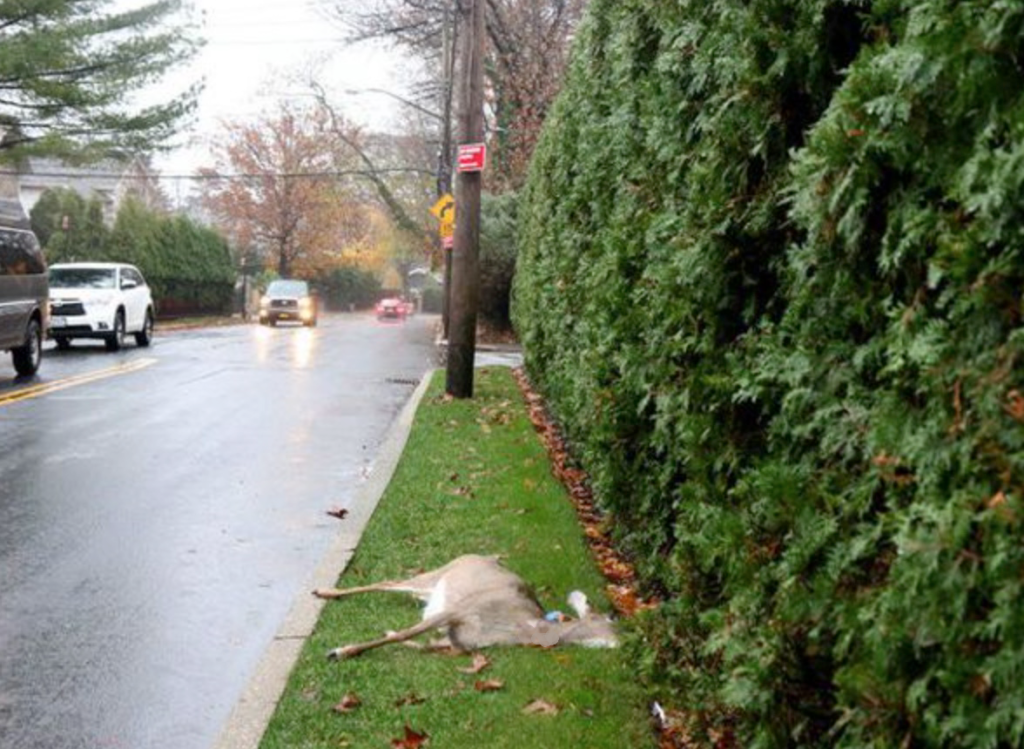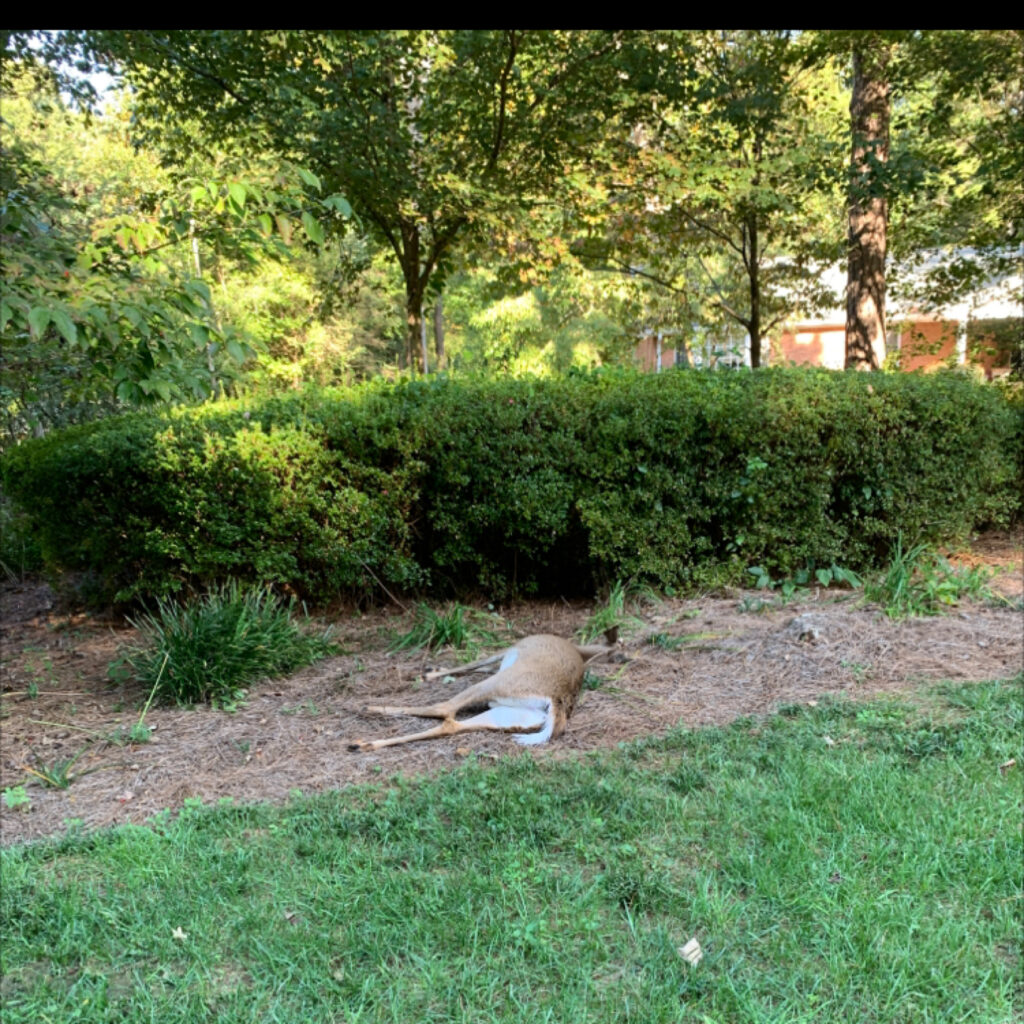Southern Wildlife Management is dedicated to providing top-notch wildlife management services, including Dead Deer Removal Services, to our clients in Johns Creek, Georgia, and the surrounding areas. We understand that encountering a dead deer in your yard can be a frustrating and unpleasant experience, especially if it happens repeatedly. In this post, we will explore some of the leading causes of deer mortality and what you can do to prevent it from happening on your property.

If the dead deer is along the right of way, as shown above, then the City or County (whoever handles the roadside maintenance in your area) will come and get it for FREE. The only problem is how long it may take them. Google: (Your City) Roadworks for Dead Animal Removal.
I made each of the cities (BELOW) clickable and each page has the phone number for you to call when it is on City or County property. We have not memorized the individual numbers so we cannot provide them when you call – Alpharetta, Big Canoe, Cumming, Johns Creek, Suwanee, Gainesville, Dawsonville, Ellijay, Milton, Duluth
One of the most common causes of deer mortality is being hit by a car. This can happen anywhere, but it is particularly common in areas where deer populations are high and there are roads or highways nearby. When a deer is hit by a car, it can be injured or killed instantly. However, in some cases, the deer may run off after being hit due to the rush of adrenaline. In such cases, the deer may die later from its injuries or from exhaustion once the adrenaline wears off.
To prevent deer-car collisions, it is important to be aware of the risks and take appropriate precautions. For example, if you live in an area with a high deer population, you should be extra cautious when driving and always be on the lookout for deer on or near the road. Additionally, you can install deer fencing around your property to prevent deer from entering the road and getting hit by passing vehicles.
Another cause of deer mortality is illness. Like any other animal, deer are susceptible to a range of diseases and health conditions. Some of the most common illnesses that affect deer include chronic wasting disease, which is a degenerative neurological disorder, and epizootic hemorrhagic disease, which is a viral infection that can be fatal to deer. If you notice a deer that appears to be sick or exhibiting unusual behavior, it is important to contact a wildlife professional who can assess the situation and provide appropriate care.

Deer hunting season can also contribute to deer mortality, particularly if hunters make bad shots. While many hunters take great care to ensure that they make a clean, ethical kill, accidents can and do happen. In some cases, a deer may be hit but not killed outright, and it may run off before the hunter can catch up to it. This can result in a prolonged and painful death for the animal.
If you are a hunter, it is important to practice good marksmanship and to make sure that you have the skills and equipment necessary to make a clean, humane kill. Additionally, you should always follow all local hunting laws and regulations, as well as any guidelines or recommendations provided by wildlife management professionals in your area.
Finally, it is worth noting that deer can sometimes get hung up on fences or other obstacles and end up dying as a result. This is particularly common with wrought iron fences that have vertical members or spires. If a deer attempts to jump over such a fence and gets caught on a spike or spire, it may become stuck and suffer serious injuries or even death.
– PREVENTION –
If the deer is getting hung up on your fence, there are a few things you can do. One option is to remove the vertical members or spires from your fence altogether, which will eliminate the risk of deer getting caught on them. Another option is to purchase ball finials that slip over the spikes, which will make them less likely to gore a deer that is leaping the fence.
Another option to consider if you have an area on your property where deer are frequently getting hung up on fences is to explore the possibility of planting shrubbery or other vegetation on the outside of the fence. By doing so, you can create a barrier that will discourage deer from attempting to jump over the fence in the first place, thereby reducing the risk of injury or death.
When selecting vegetation for this purpose, it is important to choose plants that are both attractive and effective at deterring deer. Some examples of plants that are known to be effective at repelling deer include boxwood, lavender, and yarrow. These plants have a strong scent that deer find unpleasant, which can help to keep them away from your property.
In addition to planting vegetation, there are other steps you can take to make your property less attractive to deer. For example, you can remove any sources of food or shelter that may be attracting them, such as bird feeders or piles of leaves. You can also use deer repellents or other deterrents to discourage them from coming onto your property in the first place.
There are many other reasons to manage wildlife populations in your area. For example, if deer populations are allowed to grow unchecked, they can cause damage to crops, gardens, and other vegetation. They can also spread disease to other animals, including humans.
At Southern Wildlife Management, we offer a range of wildlife management services to help you control deer and other wildlife populations on your property. Our team of experts can assess your situation and recommend the most appropriate solutions based on your specific needs and circumstances.
CLEAN UP
Sanitizing your yard after a dead animal has been removed is important to prevent the spread of disease and to ensure the safety of yourself and your family. While it is true that Mother Nature can naturally take care of some pathogens with sunlight and time, not all of them are dealt with in this way. Some pathogens can remain on the ground and other surfaces for extended periods and pose a risk to human health.
Dead animals can carry a variety of diseases and parasites that can be harmful to humans and pets. These include bacteria, viruses, and parasites such as fleas, ticks, and mites. Even if the animal was not visibly sick, it could still carry pathogens that could cause illness.
We use hospital-grade disinfectants that is designed specifically to clean up after animals.
In addition to protecting human health, sanitizing the area can also help to prevent other animals from being attracted to the area. The scent of a dead animal can attract scavengers such as raccoons and opossums, which could in turn lead to further problems.
Overall, sanitizing your yard in the area where the dead animal died after it has been removed is an important step in protecting yourself, your family, and your pets from potential health risks. While Mother Nature can do a lot to clean up outdoor areas, it is always better to err on the side of caution when it comes to potentially harmful pathogens.
Call us if you need help! (678)935-5900
